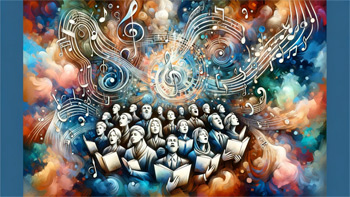Hymns play a vital role in the expression of faith in various religions, including Christianity, Hinduism, and Sikhism. These sacred songs are not just musical compositions but carry deep spiritual significance and historical roots. They serve as a medium for devotees to express devotion, recount religious narratives, and meditate on divine virtues. This article explores the unique aspects and roles of hymns in these three religious traditions.
Christian Hymns: Worship and Praise
In Christianity, hymns are an integral part of worship, serving as a way to praise and honor God. Rooted in the Psalms of the Hebrew Scriptures, Christian hymns have evolved over centuries. They are sung in churches during services and special religious occasions, facilitating congregational participation and spiritual connection. Hymns in Christianity often narrate the life of Jesus Christ, Christian values, and the teachings of the Bible. They range from traditional compositions like 'Amazing Grace' to contemporary worship music. These hymns not only enhance the worship experience but also foster a sense of community and shared belief among the congregation.
Hindu Hymns: Devotion and Mythology
In Hinduism, hymns, known as 'Bhajans' or 'Kirtans,' are deeply embedded in the practice of Bhakti (devotional worship). Hindu hymns are diverse in their themes and styles, reflecting the vast pantheon of gods and goddesses in Hindu mythology. They are often sung in praise of deities like Krishna, Rama, Shiva, and Durga, recounting their divine exploits and virtues. These hymns are an essential part of Hindu rituals and festivals, with many tracing their origins back to ancient scriptures like the Vedas and Upanishads. Through hymns, devotees express their devotion, seek divine blessings, and engage in spiritual storytelling, often accompanied by musical instruments and rhythmic chanting.
Sikh Hymns: Divine Melodies and Teachings
In Sikhism, hymns, known as 'Shabads,' are central to the religious practice. Composed by the Sikh Gurus, these hymns form the core of the Guru Granth Sahib, the holy scripture of Sikhism. Sikh hymns are sung in 'Kirtan,' a communal singing session often held in Gurdwaras (Sikh temples). The hymns of Sikhism emphasize the remembrance of God, moral living, and the unity of humanity. They are sung in various classical ragas, and their recitation is considered a way to connect with the divine and imbibe spiritual wisdom. The tradition of Kirtan is not just a religious observance but also a profound spiritual experience for the Sikh community.
Hymns, across these religions, serve as a bridge between the divine and the devotee, offering a medium for spiritual expression and communion. Whether it's through the soulful hymns of Christianity, the devotional Bhajans of Hinduism, or the melodious Shabads of Sikhism, hymns play a crucial role in religious life, transcending mere words and melodies to touch the hearts of the faithful.
